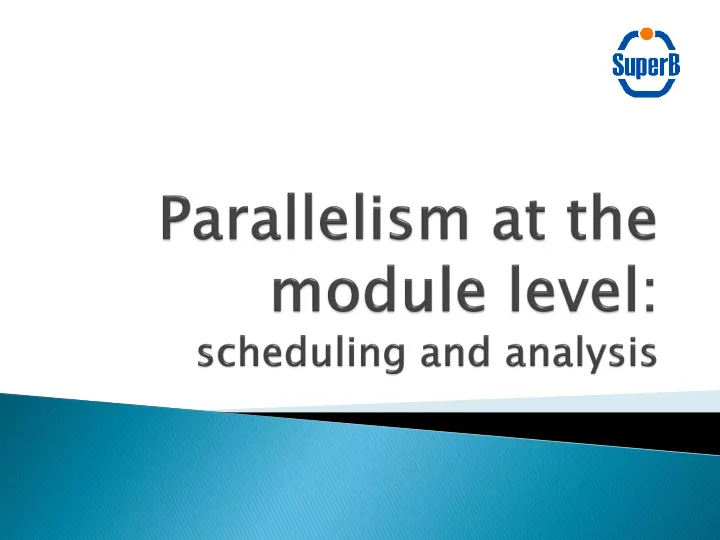

Data processing in the BaBar environment: Configuration done through Tcl files Analysis consists of a root object (path) containing sequences A sequence may contains other sequences or modules Module execution follows the insertion order (serial execution) S. Longo – 3rd SuperB Collaboration Meeting – LNF 2/15
The SuperB Framework should be able to run more modules in parallel, but … How to define which modules can be executed at the same time? How to define an execution path? Moreover, the analysis path has to be customizable at the user level, who may want to modify - to a certain extent - the «default» module sequences, or insert custom modules Scheduling has to be performed dinamically S. Longo – 3rd SuperB Collaboration Meeting – LNF 3/15
Proposed solution: use module dependencies. Each module has to declare which products it needs and which it produces. Example: Module = RandomControl Require = EventList, EventID Provides = EngineList Scheduling can then be performed dinamically S. Longo – 3rd SuperB Collaboration Meeting – LNF 4/15
Specification of dependencies: just a note. Requirements and products can be specified at compile time. Class Module4 : public Module<module_four, Requires<product_one>, Provides<product_three, product_four> { bool operator()(Event& e) const {…}; } (Thanks to F. Giacomini for the example) Dependencies can also be specified at run time, losing compiler checks but allowing more flexibility. Probably a mix of both is the right solution S. Longo – 3rd SuperB Collaboration Meeting – LNF 5/15
Using the exposed definition of a module, the Framework can produce a dependencies graph. From dependencies graph it’s easy to get the execution order. The scheduler just has to: Module = M1 Require = ‣ Checks for each module Provide = P1 if the requirements are Module = M2 met Require = ‣ In this case, schedules Provide = P2 the execution of the Module = M3 module Require = P1 ‣ Adds products to the Provide = P3 next level of the graph Module = M4 ‣ Repeats untill all Require = P2 P3 Provide = P5 modules are scheduled S. Longo – 3rd SuperB Collaboration Meeting – LNF 6/15
We have developed a working prototype of the scheduling algorithm that: Takes a generic list of modules with dependencies as input Produces a generic dependencies graph as output A TBB graph can then be obtained from the dependencies graph. Being a generic graph, the same algorithm can be used to instruct other schedulers (libdispatch?) To check both performances and correctness, we have taken some measurements of the algorithm performances S. Longo – 3rd SuperB Collaboration Meeting – LNF 7/15
Benchmark setup : 1k module lists 100 modules per list Random requirements (0-2) and products (0-4) Population characteristics: Tree Depth = 6 ÷ 15 Tree Rank = 1 ÷ 41 Execution time on an Intel Core i5-2400: less than 5ms S. Longo – 3rd SuperB Collaboration Meeting – LNF 8/15
Here is how a produced dependencies graph looks like S. Longo – 3rd SuperB Collaboration Meeting – LNF 9/15
We are investigating the parallelism level of FastSim, employing an analysis example (PacMC/snippet.tcl) The analysis is configured employing tens of Tcl files Each file may define sequences, enable modules, define parameters or include other Tcl files. Extraction of sequences, modules and parameters must be done automatically. A two stages approach is needed: Tcl file parsing to get modules and their parameters Source file parsing to get dependencies and defaults S. Longo – 3rd SuperB Collaboration Meeting – LNF 10/15
Current Status: Recursively parsing of Tcl file: almost done. We are able to get near all the modules in the analysis path, evaluate variables and get parameters set via «talkto». Parsing of associate module source files: still in progress At present we are able to manage «standard» ::get and ::put instructions issued on the proxy, get parameters type and evaluate some variables. S. Longo – 3rd SuperB Collaboration Meeting – LNF 11/15
A get example: Ifd<<proxyType>>::get ( <AbsEvent>, <key> ) We are still working to solve some problems: Management of non standard get/put Variables scope OOP Polymorphism (i.e. get proxy type that is a son of the put type) Default values S. Longo – 3rd SuperB Collaboration Meeting – LNF 12/15
Work is still in progress. Currently we can extract partial graphs of the analysis path like the following one S. Longo – 3rd SuperB Collaboration Meeting – LNF 13/15
Some observations and questions: Even if the analysis is still partial, FastSim exposes some parallelism at the module level. We should try to exploit it Regarding the module definition: Does the proposed definition of a module with requirements and products fit our needs? In FastSim some modules modify event properties (ex: BtaSelectCandBase). Is this a requirement we can avoid? Is there any module written being aware of its execution position in a sequence? S. Longo – 3rd SuperB Collaboration Meeting – LNF 14/15
Recommend
More recommend